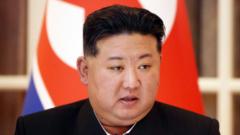North Korean leader Kim Jong Un has reportedly overseen a new missile test, with state media claiming that two air defense missiles were successfully fired, showcasing what the Korean Central News Agency (KCNA) described as "superior combat capability" and "unique technology." The test, which took place on Saturday, aimed to validate the missiles' effectiveness against various aerial threats, such as drones and cruise missiles.
This missile launch follows shortly after South Korea confirmed that it fired warning shots on Tuesday at North Korean troops who briefly crossed the heavily fortified Demilitarized Zone (DMZ) that divides the two nations. About 30 North Korean soldiers crossed over, prompting a swift response from the United Nations Command. In retaliation, North Korea accused South Korea of engaging in "deliberate provocation."
As tensions mount, South Korea and the United States have been conducting extensive joint military exercises since Monday. U.S. President Donald Trump is planned to meet with South Korea's President Lee Jae Myung at a summit in Washington on Monday. The newly elected South Korean president campaigned for enhanced inter-Korean relations, yet Kim's sister has dismissed any reconciliation efforts initiated by Lee's administration.
Earlier this month, Kim condemned the joint military drills between the U.S. and South Korea, characterizing them as "most hostile and confrontational." He also expressed intentions to expedite the development of North Korea's nuclear arsenal. This missile test follows earlier claims by North Korea in January of successfully launching an intermediate-range ballistic missile designed with a hypersonic warhead, purportedly aimed at deterring rivals in the Pacific region.
Concerns have been raised regarding potential collaboration between North Korea and Russia, with assertions that North Korea may be acquiring missile technology from Russia in exchange for military support in Ukraine. However, it remains unclear if the recent tests involved any Russian technological input.
North Korea stands as one of the world's most repressive totalitarian regimes, with the Kim dynasty ruling for decades. Since the cessation of hostilities in the Korean War in 1953, the two Koreas have remained technically at war, as no official peace treaty was signed, although the situation has seen a prolonged absence of conflict.



















